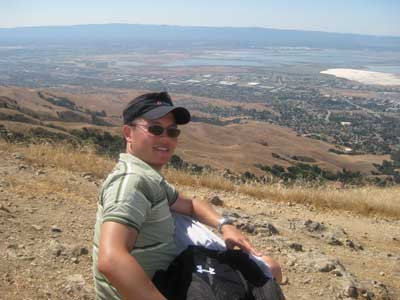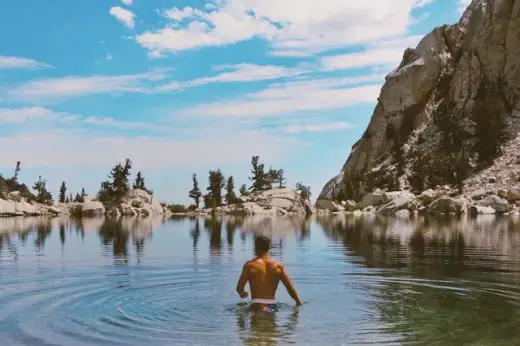
Camping can be great fun, and chances are you’ll be so preoccupied with all of the outdoor activities you won’t even be thinking about your appearance. That being said, it is important that you maintain a certain level of hygiene for your own health and the comfort of those around you.
The question is, how do you maintain your hygiene when you are camping with limited facilities?
There are a number of hygiene hacks that you can use when camping to ensure you have good hygiene. This guide will address all of your concerns and help you to keep clean on your next camping trip. In particular, we’ll address the following:
- What should I pack to maintain personal hygiene when camping?
- What things should I avoid when packing personal hygiene items for camping?
- How do I brush my teeth when camping?
- How do I wash my hands when camping?
- How do I shower when camping?
- How do I wash my clothes when camping?
- How do I look after my feet when camping?
- How can feminine hygiene be managed when camping?
- How can I wash my hair when camping?
- How far away from water sources can I wash?
- What clothes are the best for maintaining hygiene when camping?
- What are some hygiene hacks I can use when camping?
What Should I Pack to Maintain Personal Hygiene When Camping?
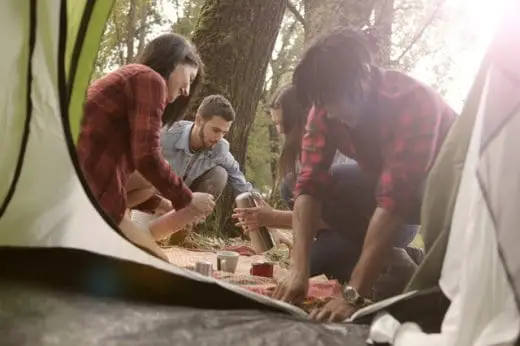
It is important that you pack the right equipment to allow you to manage your hygiene when you are camping. The equipment and products that you take should be environmentally friendly where possible, and rubbish should always be taken home with you. The intention should always be to leave no trace when you are camping or hiking in the bush.
While you will want to pack light for your camping trip, there are a few items that are absolute essentials when it comes to maintaining hygiene. The items that should be on your camping trip packing list are:
- Microfiber towel
- Hand sanitizer
- Body/face wipes (compostable if possible)
- Environmentally friendly body wash (look for biodegradable/phosphate-free)
- Ziploc bags (for taking home wipes)
- Travel clothesline
- Toothbrush
- Toothpaste
- Washbag (for washing clothes)
What Things Should I Avoid When Packing Personal Hygiene Items for Camping?
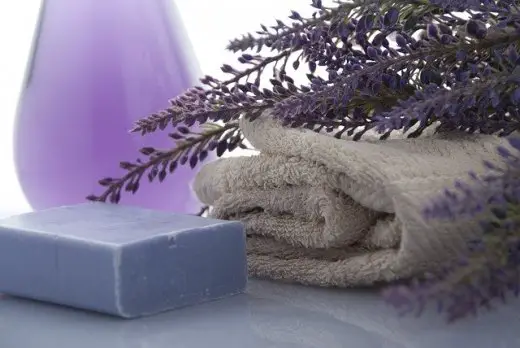
When camping, you should try to avoid products that will leave evidence of your visit or negatively impact the environment. These types of products include:
- Soaps and body washes that are not environmentally friendly (including ones that have phosphate)
- Non-biodegradable personal care items
- Personal products that have a strong scent (likely to attract insects)
- Products that generate waste
How Do I Brush My Teeth When Camping?
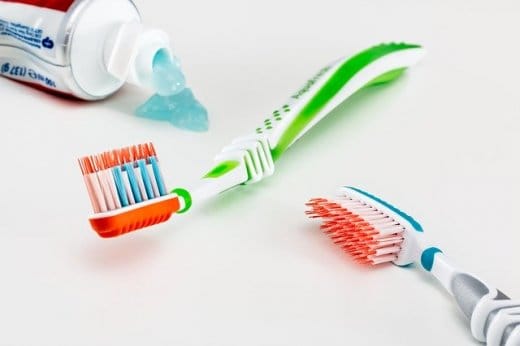
Teeth brushing is an everyday activity that doesn’t usually require much thought. This changes a little when you are camping, especially if you are in a remote location. It is likely that you won’t have bathroom facilities like a sink and running water to help keep your teeth clean and white.
As with any trip, it is important to remember both a toothbrush and toothpaste. Pack your toothbrush in a protector so that it does not get dirty in your bag. These can be purchased from any camping or travel store, as well as standard department stores. Try to buy biodegradable toothpaste as you will be spitting this outdoors and don’t want to impact the natural environment and wildlife.
When you are ready to brush your teeth during your camping trip, use the following steps:
- Take a small amount of biodegradable toothpaste (less than you would usually use to limit your footprint).
- Proceed to brush your teeth like normal.
- Make sure you have a water bottle handy as you will need to use this to rinse.
- When you have finished, fill your mouth with water to rinse and spray it out. Try to spread this over a vast area as this is better for the environment than simply spitting in one spot. It will help to spread the liquid out, allowing it to absorb much quicker.
- Another option is to dig a hole and deposit your toothpaste residue there instead.
How Do I Wash My Hands When Camping?
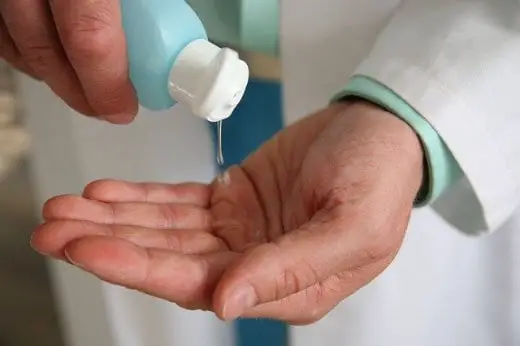
Hand washing is extremely important when camping. You will likely be exposed to natural elements that you do not interact with typically, and this may test your immune system. Viruses and germs can also spread quickly amongst a group of people if you are on a trip with friends and families, and thorough handwashing will help to control this.
If you want to wash your hands, you have are a couple of different options:
Portable sink
When you are at base camp, you can set up a handwashing station with soap. Make sure that the soap you are using is eco-friendly to minimize your impact on the environment.
It is a good idea to have this station near your kitchen items so that people can wash their hands before preparing food. It also provides an easy place for people to wash their hands after going to the toilet, coming back from fishing, or simply going for a hike.
Hand sanitizer
Given that you will not always be at base camp, you need to be prepared with another method for hand washing.
Cue the hand sanitizer. This makes hand hygiene so much easier when camping as you can take it in a small bottle that can easily be stored in your bag or even a pocket.
Make sure you keep hand sanitizer on you at all times. You can use it to clean your hands before eating when on a hike, to remove germs after a toilet trip, or simply to clean regularly to prevent the spread of germs. High-quality hand sanitizers are available in chemists or department stores and will help to avoid the spread of germs at a campsite.
How Do I Shower When Camping?
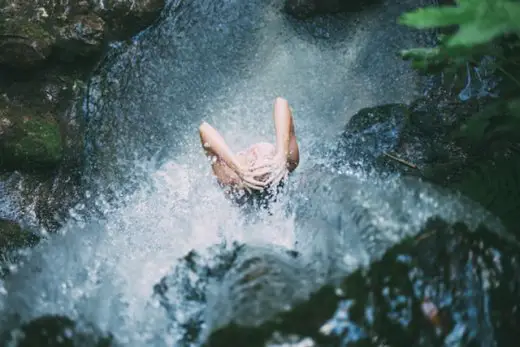
Regular showers are an important aspect of maintaining good hygiene. However, it becomes a bit more difficult when you are camping without running water. Just because it is difficult does not mean it should be avoided.
Even though it’s easy to go to sleep without showering, you must resist the urge to simply curl up in your sleeping bag after a long day without cleaning thoroughly first. It is better for your health and hygiene if you shower regularly, and it will also help your gear to last longer as you won’t need to clean it as regularly.
Fortunately, there is a range of options to keep your body clean when you are camping.
Portable shower
The easiest way to get a decent shower is to take a portable one.
These devices come in pocket-sized packs that are easy to carry and suitable for even the lightest packers. A pocket shower is a bag with an attached shower head. You can hang it up at your campsite and enjoy a shower each day.
Many of them heat the water when they are hung in the sun and provide up to 8 minutes of warm water. While not everyone will want to carry the additional weight of a pocket shower, this is a good option for summer travel when you may get sweaty during your outdoor adventures.
Bathe in a river or lake
If there is a river or a lake near your campsite, you can use this to clean every day. However, the only environmentally responsible way to clean in a natural water source is to wash without any form of soap at all. Soap will contaminate the water, as will inspect repellent or sunscreen if you have that on your skin.
Anything with phosphates should be avoided, as they have a detrimental impact on water sources and animals. Phosphates encourage the growth of algae, reducing the amount of oxygen in the water and negatively impacting the habitat of a range of aquatic wildlife.
In many cases, it might be more appropriate to collect a bucket of water and pour it over you instead. This is especially important if people are using the river for drinking water as you don’t want to pollute the water they are consuming.
Sponge bath
If you don’t have a portable shower or natural water source to bathe in, grab a bucket of water and give yourself a sponge bath. To make the bath, you can use a camping stove to heat some water and then add some body wash.
Eco-friendly or biodegradable choices are best for camping, as the residue will be going straight into the soil. Use a cloth to wipe off your body with the soapy water. If you have trouble reaching everywhere, try using a water bottle with a pop-top that can squeeze water to the places you can’t reach
Wipes
Wipes come in handy when you need a quick clean, or when there is no water available for showers. You can choose to take some standard baby wipes or something a little more luxurious, depending on your particular taste.
Always make sure that you take all wipes home with you to minimize your impact. If you are truly environmentally conscious, it is worth looking for compostable wipes that you can compost when you get home.
How Do I Wash My Clothes When Camping?
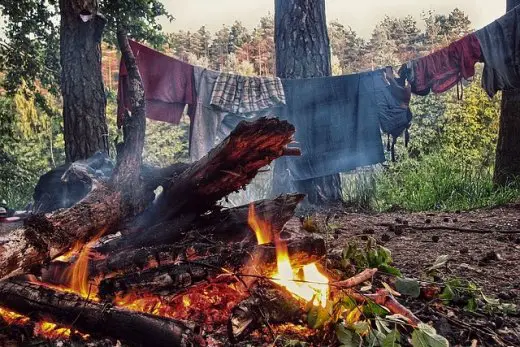
Washing your clothes is an important part of maintaining good hygiene when camping. There’s no point in spending the time washing your body if you are only going to put dirty clothes back on. When camping, you will likely be traveling light with only a few outfits. This means that you will have to wash as you go to ensure a clean supply of clothing.
The quickest option is to hand wash your clothes. All you need is a bucket, water, and some eco-friendly laundry liquid. Wash each item thoroughly in the bucket, give it a rinse and wring it thoroughly before hanging it to dry on your portable clothesline.
For the frequent campers, it might be worth investing in a wash bag. This acts as a portable washing machine and makes it easier to ash your clothes. Simply add your clothes, water, and eco-friendly detergent to the bag, get rid of the air, and seal it up.
Move it around for a few minutes to stir up the soap and wash the clothes, the rinse each of your garments. Again, finish the process by hanging in on the portable washing line to dry.
All dirty water should always be discarded far away from water sources so as not to pollute them. This is important even if you have used biodegradable, eco-friendly washing products.
How Do I Look After My Feet When Camping?
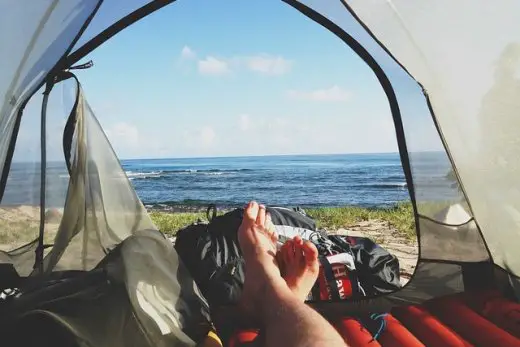
Looking after your feet is a big part of healthy hygiene. Nobody wants to return from their camping trip with a fungal infection! The reality is that your feet will be stuck in boots and will likely be getting wet or sweaty throughout some stage of your trip.
To avoid feet problems, make sure you dry your shoes properly every night. If you’ve been in particularly muddy areas, you may even need to wipe them off first to stop bacteria from transferring to your feet.
Also, make sure to clean and dry your feet properly every night before bed. If you don’t have a shower, use a sponge or wipe to clean each foot, including between your toes. Dry your feet thoroughly and give them some time to breathe if possible. If it’s cold, make sure to dry them properly before putting on socks.
How Can Feminine Hygiene Be Managed When Camping?

Managing a menstrual cycle can be difficult if you are camping in a remote location without bathroom facilities. However, it’s not impossible.
A menstrual cup is the best choice and also the most eco-friendly. This will allow you to engage in your planned activities, and you will not need to find somewhere to store rubbish to take home.
The biggest thing to remember is that your hands must be completely clean when using a menstrual cup, so make sure you have biodegradable soap and hand sanitizer. You can empty the contents of the cup in a hole, in the same manner as going to the toilet in the bush, and cover it with soil.
If a menstrual cup isn’t for you, don’t despair. It is possible to use disposable products such as pads and tampons, although you will need to take these home with you. Prepare a small bag with feminine hygiene products that you can quickly access when you need to. A Ziploc bag is a good option and can be covered in an opaque tape for discretion.
How Can I Wash My Hair When Camping?
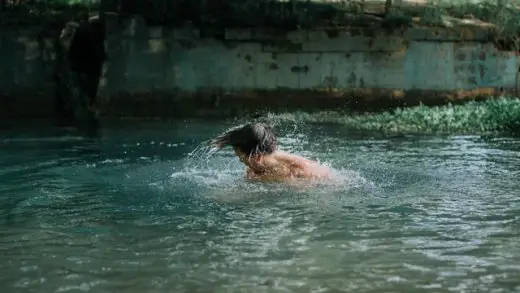
There is limited hot water and certainly no hairdryers when you go camping. This can be problematic for people who are especially particular when it comes to hair care. It is likely that you will need to leave your hair a little longer between washes on your camping trip.
If you’re worried about it looking greasy, simply tie it up or throw on a hat. Dry hair shampoo also works wonders; however, make sure that you use a brand that is environmentally friendly in case some residue finds its way to the soil.
It is also possible to rinse your hair in a natural water source or give it a quick wash using a portable shower. If you are bathing in a river or lake, you will not be able to use shampoo; but that doesn’t mean you can’t clean it with water.
Shampoo bars are good for camping if you are using a portable shower and will ensure the liquid contents don’t get spilled through your bag. They are lightweight, save on space, and will give your hair a more thorough clean than a simple rinse with water.
How Far Away From Water Sources Can I Wash?
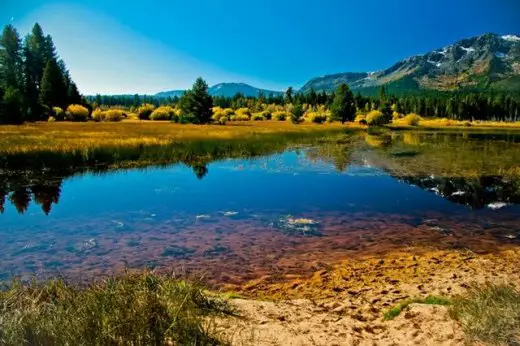
To ensure natural water sources are protected, you must not use any washing products (even biodegradable ones) to wash in this water. You can rinse in a lake or river but will only be able to clean with the water itself.
If you have a portable shower or are washing clothes or dishes, make sure that this water is disposed of far away from natural water sources and your campsite. As a general rule, take a shower or tip out dirty water at least 200 feet away from water sources. This distance should also be applied for campsites so that you do not make the area wet and affect other campers.
What Clothes Are the Best for Maintaining Hygiene When Camping?

If you are planning on being active during your hiking trip, you need to consider the type of clothing you will take. Physical activities like hiking can result in you becoming sweaty and smelly, an issue if there is limited water to shower with.
Certain materials are worse for odor issues than others. For example, polyester clothing is sure to become smelly quickly if not washed regularly. This is because micrococci, a type of bacteria, grow on this material more effectively than other materials.
This article is owned by Recapture Nature and was first published on March 13, 2020
Cotton reduces the presence of these bacteria, as it does not facilitate the growth of it like polyester. However, it comes with its own issues. This material has high absorbency meaning it will hold your sweat. This can also be problematic for drying, especially if you are wearing cotton clothes in winter.
Wool is the best material for minimizing odor. High-quality wool clothing can be expensive but is definitely enduring, so you will get value out of it. Wool clothing can be worn multiple times before washing is required and is even suitable in the summer.
Wool is effective in minimizing odor for a range of reasons:
- It does not absorb sweat. It causes bodily fluids and oils to be evaporated into the air, rather than retaining these and developing a smell.
- Wool has fatty acids that are anti-bacterial. Wool fiber has a distinct make-up, with the outer component consisting of fatty acids. These fatty acids have properties that prevent bacteria from building and therefore help to manage odor and hygiene.
- Wool fibers bind with body odor. The internal part of a wool fiber connects with odors that are sulfurous, acidic, or basic in nature. This includes body odors, which bind with the wool fiber and prevent a smell from occurring.
While wool clothing can be worn multiple times without being washed, it is highly recommended that you change into clean clothes each night. This will give your clothes and body a chance to air out, making it easier to maintain a decent level of hygiene. If conditions do not allow for this, at least change underwear and socks to remain clean and odor-free.
What Are Some Hygiene Hacks I Can Use When Camping?
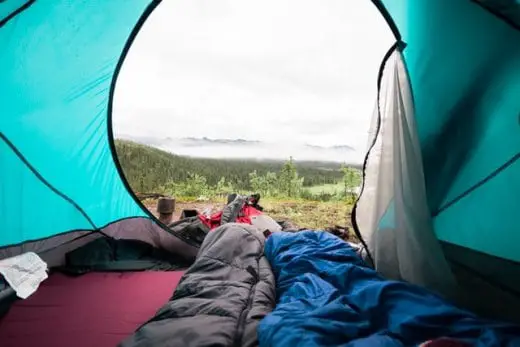
Here are a few tips and tricks to help you stay clean and comfortable on your camping trip.
This article is owned by Recapture Nature and was first published on March 13, 2020
Use a sleeping bag liner
Sleeping bag liners are a great way of keeping you clean and comfortable on your camping trip.
Rather than hopping straight into your sleeping bag, put in a liner, as this will absorb any dirt and oil from your body. Sleeping liners are easy to wash and be hung out in the day to get some air, unlike your sleeping bag, which will just absorb the fluid for you to sleep in the following night. This is also an effective method to make your sleeping bag last longer.
Pack dots of toothpaste
Save space and prevent leakage by packing toothpaste ‘dots’ rather than a whole tube. Toothpaste is obviously an essential item, but it can be difficult to pack for a camping trip. Instead of taking a tube of toothpaste, get organized and prepare toothpaste dots before you leave.
Begin by laying down a piece of foil and squirting dots of toothpaste on it. Leave them to dry, which will make them go hard, then sprinkle baking soda over them. Add all of the dots to a small container, like a Tic Tac jar, and pack this in your camping gear. The baking soda will stop all of the dots from sticking together, and you will be able to use one at a time whenever you need to brush your teeth on your trip.
To use a toothpaste dot, place one in your mouth, and chew. Then all you need to do is brush for nice, clean teeth.
Pack slivers of soap
It is unlikely that you will need an entire bar of soap on your camping trip, so save some space by making some soap slivers instead. You can do this by taking a vegetable peeler and dragging it over the soap to create smaller pieces. This also makes use of the soap more convenient as you can simply take out one sliver at a time.
Keep all hygiene items packed together
Have a small container or Ziploc bag where you can store all of your hygiene items. This will make for easy access when you need to take a shower or brush your teeth as everything will be together and easy to find.
This is also good for storage, especially if you are staying in an area that will attract wildlife. Scented items attract bears and other animals, so it is best to store them outside of your tent. If all items are together in one bag, it is easy to grab it and place it elsewhere.
Always have enough socks and underwear
Even if you want to pack lightly, never go short on underwear and socks. These are critical for maintaining your hygiene and ensuring you don’t smell.
This article is owned by Recapture Nature and was first published on March 13, 2020
Summary
To recap, here are the main points you should take away from this article:
- Maintaining hygiene when camping can be difficult, but it is extremely important. It is the only way to ensure you stay healthy. Also, bad hygiene can lead to odor problems that will impact others.
- It is important to be aware of your environmental impact and take action to reduce your footprint. This includes only packing eco-friendly, biodegradable products that will not detrimentally impact the natural environment and wildlife.
- Hand sanitizer, wipes, and a microfiber towel are all critical for maintaining hygiene while camping. Other essentials such as toothpaste, toothbrush, and soap are obviously also important.
- All liquids (including shower water, toothpaste spit, dirty dishwater) should be spread at least 200 feet away from water sources. This is to ensure the water doesn’t get contaminated and affect wildlife.
- There is a range of options for showering when camping. You can take a portable shower, wash in a river or lake, or give yourself a sponge bath.
- Clothes can be washed by hand or by using a portable washing bag. Always remember a portable clothesline to hang your clothes out to dry.
- Always change into clean clothes before bed. This gives your outerwear a chance to dry and air out, but also ensure you aren’t bringing dirt and bacteria into your sleeping bag. This will simply be absorbed, and you will then be sleeping in filth every night.
- It is important to look after your feet. If your feet aren’t cleaned and dried properly, you risk developing a bacterial or fungal infection.
- Pack all of your hygiene items together. This will help with making them easily accessible, but also ensure they are easy to store outside of your tent. It is best to store hygiene items in a secure place away from where you are sleeping as they can attract animals.

